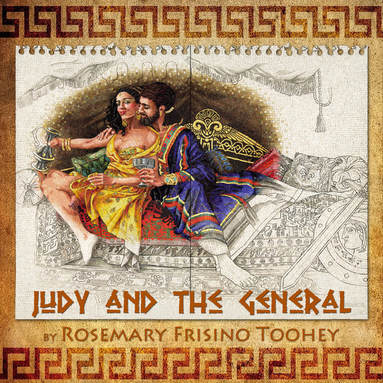Are you ready to go back in time? It’s not about history or geography (though it’s important to note the current dates— through July 29, 2018— and the exact location— The Audrey Herman Spotlighters Theatre—) it’s really just about a he and a she, but don’t get caught up in the details. Because the big important detail is that this show— this world premiere musical— is the closer of Season56 at Spotlighters. Judy and The General, a world premiere musical now fitted to the stage at Spotlighters Theatre, as Stage & Musically Directed by Michael W. Tan is playwright Rosemary Frisino Toohey’s first musical, and a much anticipated one after all the bumpy ups and downs that peppered Spots’ 56 season to get it to this point.
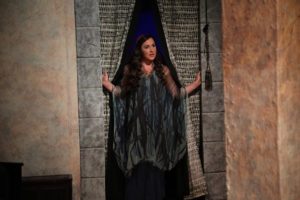
The story is iconic, infamous in many circles of history, religious study, and art. While the tale of Judith and Holofernes isn’t yet a household name in biblical-stories-turned-stage-musicals (like Joseph and…, Superstar, or Godspell, who have all taken stories from the bible and given them the theatrical razzle-dazzle polish and flare) Rosemary Frisino Toohey sets out to create an irreverent comedy that showcases the strength of one women fighting the patriarchy for her truest beliefs. While the show is not without its issues, as are to be expected in any new work, the core of the story itself and the protagonist are constructed with the strength of Sampson, and the empowering voice that Toohey gives to the Judith character is one that speaks to the times, despite the story’s ancient setting.
Having written the libretto as well as having composed the majority of the melodies (with harmony assist and musical arrangement by musical collaborator Michael W. Tan), Toohey has placed a tall demand upon herself as master of the creation, but one at which she does mostly succeed. The shows biggest issues is its inconsistency in tone. This is difficult to address because so much of the rich, irreverent humor that Toohey infuses into the dialogue (as well as the lyrics of the songs) is ultimately what makes the show a witty comedy rather than a biblical retelling. But often the bouts of irreverence smack of strange modernity, which jostles the overall biblical setting, around which the show’s aesthetic is crafted. It’s not that the jokes aren’t funny, many of them are well worth the laugh for the disruption that they cause in the show, but this creates pockets of disjointedness and an uneven delivery overall.
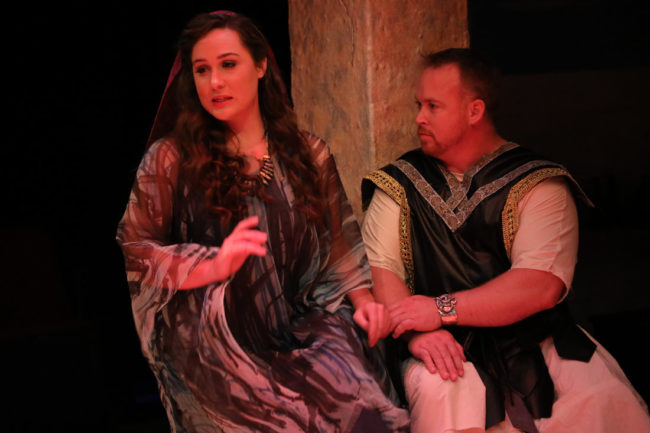
The other major issue contained within what is a truly brilliant approach to retelling this story is the musical inconsistency. While there are a great many musicals who succeed (think Joseph and… where every musical number is starkly different stylistically from one another) in having such a varied range of musical styles, because Judy and The General has a patchy cohesiveness in its narrative and overall plot trajectory, the highly varied musical styles further pull the work apart, giving it an unstable foundation. Toohey’s musical composition skills feel raw; there is a surging presence of emotional connectivity to the more serious and ballad-esque musical numbers, but overall the composition lacks finesse. This is not to say that Toohey has not composed solid music, because she has. But there are places, in particular “A Scary Proposition” which results in an uproariously ridiculous tango-dance from two of the male characters, that just don’t gel with everything else that’s happening.
Toohey shines with creative genius and musical know-how when it comes to the character of Judith, who is often and mostly referred to as ‘Judy.’ This is one of the show’s most redeeming features; the core protagonist has a clear trajectory, character arc of growth. The solo songs written for Judy define the protagonist’s voice, shape her story, and are arguably the finest songs in the show. What’s ironic is that where the rest of the musical numbers often feel out of sync with one another and do not necessarily fit cohesively together, all of Judy’s solos feel as if they came from one place, with extremely fluid connectivity. “Closer to My Heart” is the first example of this, and Toohey blends musical expression and stylistic patter to create the perfect introduction into the mind of the Judy character.
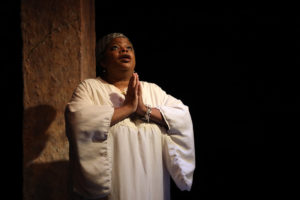
Another superb musical and lyrical success in the show arises in “Gone Now”, yet another of Judy’s solo numbers. In addition to being situated perfectly within the originating actress’ wheelhouse, the song is haunting and yet melodically simple. “Gone Now” is the emotional core of Judy’s tale and could easily be the best number in the show. A secondary contender for that honor is Judy’s “What am I Feeling?” This number is dynamic, a powerful blend of lyrics and melody, spirit and emotion. Other strong and well-composed melodies include “I Don’t Stand a Chance”, which is a shared number between Judy and The Maid.
The overall character of the maid is another problematic element in the production. Starting off life as the narrative force, and then being inserted into the story as Judy’s Maid, this character at times feels contrived. A lot of dialogue (and in particular the duet— “The Servants’ Lament, Why Can’t We Switch”— which the character shares with a character who is the servant to the king) feels superfluous and often appears to come from nowhere. The aforementioned duet, while funny, does not feel like it actually belongs in the show— two characters who have never met, never meet again in any significant fashion after the number concludes, and who otherwise have no interactions— creating one of those disjointed pockets that pop up throughout the show. By the show’s conclusion, the narrative element of the Maid’s character has almost overtaken the show and split the focus of whose story is being told, which adds another slight layer of confusion to the overall experience.
The originating cast creates a lasting impression on the work as well. While all five individuals (none of whom are strangers to the Baltimore area theatre community) are exceptionally talented, the way some of the songs are written create challenges for these individuals. This is primarily true of the actress playing The Maid, Kay-Megan Washington. Known for her stellar mezzo-belting ability, Washington tries in earnest to tackle some of the higher melodies foisted upon the Maid character, forcing her into an airy head voice, which at times detracts from the sassy prowess that Washington imbues to the character. Despite the challenges of the way the Maid’s melodies are presented, Washington succeeds in crafting a convincing character, especially when it comes to her zippy one-liners and overall fierce attitude.

Clever as always, the production team at Spotlighters Theatre— including resident Set Designer Alan Zemla, Costumer Supervisor Julia Golbey, Lighting Designer Fuzz Roark, and Specialty Props Designer Meaghan Toohey, as well as Stage Manager Felix Cooke and Set Dresser Laura Nicholson— makes the show fit into the demanding challenges that the in-the-square underground theatre space provides. Zemla’s simplistic approach the scenery leaves much to the imagination, but inspires just enough spark (between the verisimilitude of the unevenly laid bricks on the seating banks and the cracks painted by hand into the columns to generate a rustic look) the mind and engage the audience with the setting. Golbey’s costumes are equally simplistic, hinting at the era without overbearing on the production as a whole. Roark follows suit and errs on the side of basic lighting, except for one very thematic burst of dramatic red at the climax of the show’s action. Nods of praise go to Zemla, Nicholson, and Meaghan Toohey for their fine work on the props, in particular the rolling throne of the King, which really puts them ahead of their time.
Stage and Musical Director Michael W. Tan does an impressive job with the show’s pacing, though one wonders if the show would be better served without the intermission. It reads as such a short show, with perpetual motion in the build of the plot (however inconsistent) and from start to finish without an intermission would come in at just over 90 minutes. By pausing the action, something gets lost in this short biblical fairytale, but that is a minor point of contention, all things considered. Tan’s stage blocking as well as his limited choreography serves the simplistic vein of the show well, letting the audience focus on the story being told rather than distracting them with flashy setups and dance moves. The music crafted for Judy and The General (the tango number not withstanding) doesn’t lend itself to heavy dance routines, and Tan recognizes that well. Blocking in the challenging space is no easy task, but Tan ensures that all sides of the in-the-square house get equal distribution among the characters.
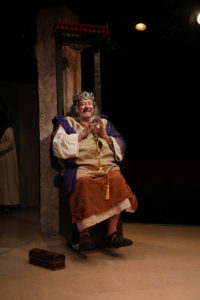
With three character men playing all the male characters, Wayne Ivusich, Richard Greenslit, and Rob Wall take on a great deal of the story, shouldering the burden of the patriarchy upon their shoulders. Ivusich has two dueling roles which are extremely memorable, the first being the simple-minded father of Judy, whose jovial and naïve nature is endearing. The second of which is his absurdly stupid King character, which is laughable and full of nonsense that truly showcases the point Toohey is making about the male-dominated societies of the time. Greenslit, who takes on the role of the subtly cheeky servant to the king, as well as various other parts, has a delectably powerful voice which well serves the songs he sings, like “He’s the Best” and “The Servants’ Lament, Why Can’t We Switch.”
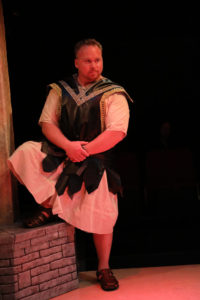
Rob Wall, tackling both the role of the adoring and loveable Manasseh and the chauvinistic misogynistic Holofernes, shows dynamism when differentiating between the two. “April”, though lyrically unbalanced, is a lovely duet between Wall and the Judy character (played by Kellie Podsednik.) The larger problem with the Holofernes character is not with Wall’s portrayal or performance but rather the stilted dialogue, which is scripted to sound somewhat like a womanizing icon of the 1940’s. This is awkwardly apparent in his duet with Judy, “A Meeting of the Minds.” The lyrics here, though again hilarious, feel stifled and at times contrived. Wall, who has a powerhouse voice which is well suited for both the General and the Lover (Holofernes, and Manasseh respectively) is vigorous in his approach to this work, creating memorable moments in each role.
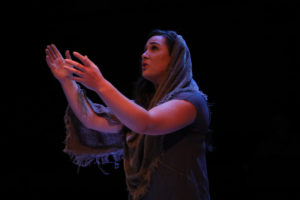
Podsednik, in the titular role, is more than just Judy. She is the voice that gives spirit and flight to Toohey’s lyrics, particularly in her opening solo “Closer to My Heart.” The connection that Podsednik makes with Judy early on is a palpable one; she shows the audience that Judy is a bright, eager, young woman thirsty for more than her dehydrated, impoverished, desert life can provide. There is an ease and a grace that Podsednik brings to Judy, even in her most doubtful hour. Toohey’s strongest constructs in the show are Judy, Judy’s overall progress and the songs that Judy sings and Kellie Podsednik delivers magnificently in all three arenas.
It is a rare and thrilling chance to experience new work in its fledgling infancy. Spotlighters Theatre is giving theatrical audiences of Charm City exactly that opportunity with this first, fully-staged production of Rosemary Frisino Toohey’s Judy and The General. Well worth investigating, and full of laughs, the show is one to be experienced.
Running Time: 1 hour and 50 minutes with one intermission
Judy and the General plays through July 29, 2018 at The Audrey Herman Spotlighters Theatre— 817 St. Paul Street in the historic Mount Vernon neighborhood of Baltimore City in Maryland. For tickets call the box office at (410) 752-1225 or purchase them online.

